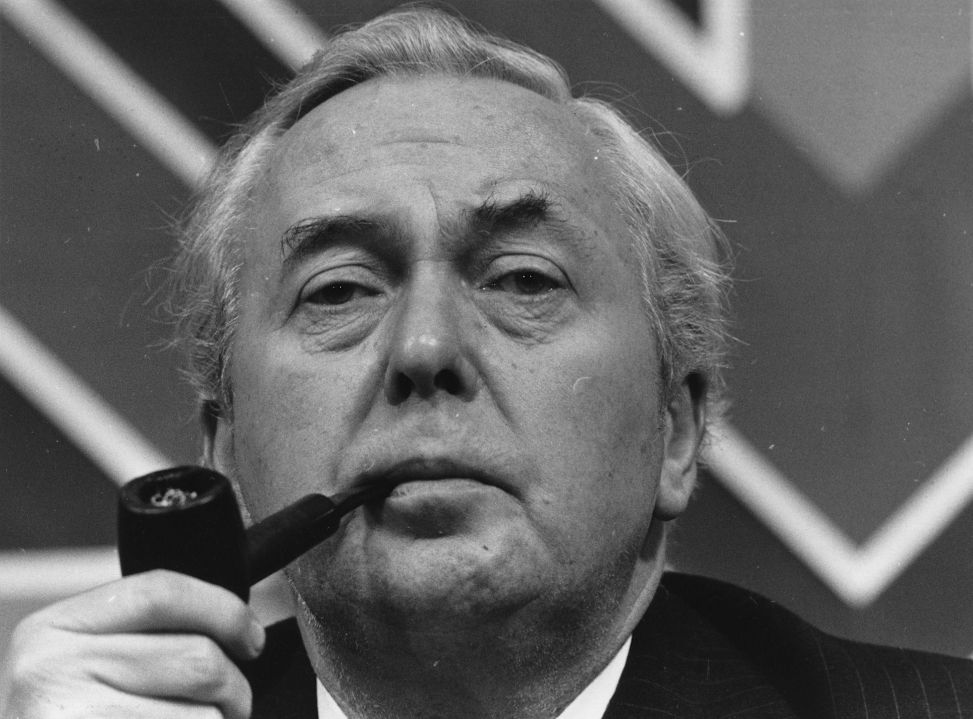Does anyone still talk about Harold Wilson, the Labour prime minister who died 30 years ago today? Though the Labour party often seems keen to forget a leader who won – almost uniquely – four out of five elections, he was, perhaps more than anyone, the prime minister who ushered in the modern age.
When he stood in the general election of 1964, he was widely billed as a moderniser. Up against Tory Alec Douglas-Home – the grouse-shooting Old Etonian Earl, who described the old age pension as ‘donations’ to the elderly and had used matchsticks to understand economics – Wilson seemed like the dawning of a new age. Words like ‘thrusting,’ ‘dynamic,’ ‘purposeful’ and ‘scientific’ were thrown about him, and he promised a ‘New Britain’ ‘forged in the white heat’ of a technological revolution. But as he took over a country with an £800m current account deficit, its rising expectations of social justice swiftly floored by a sinking pound, Wilson’s vision of a technocratic paradise seemed to vanish.
Looking at photos of Harold Wilson now, with his pipe, Gannex raincoat, his strangely flat, terrapin-like face and halo of white, wavy hair, it’s a shock to think he ever seemed the modern man incarnate. Yet he had risen from the suburbs of Huddersfield through the grammar school system to become the outstanding PPE student of his day at Oxford. He’d been a don at 21, an MP at 29, and president of the ‘Board of Trade’ just two years later, making him the youngest minister for 150 years. All this happened – as his biographer and fellow MP Alan Johnson points out – without Wilson ever cultivating deep roots in the party: ‘His approach to the Labour party was like his approach to religion – a believer but never devout.’ Yet as a wind blew from the North and actors such as Albert Finney, bands such as the Beatles, and writers such as Keith Waterhouse rose to prominence, Harold Wilson, with his West Yorkshire accent, strange gravitas and punchy comic timing, seemed to be riding a wave.
It was his very normality that made him a vote-winner. While colleagues like Roy Jenkins and Tony Crosland seemed to revel in the arts, foreign travel and fine dining, Wilson took his holidays in the Scilly Isles and enjoyed nothing more than an evening at home with a pork pie and splatter of HP sauce. He was, said cabinet colleague Shirley Williams, a ‘perfect microcosm of the British middle class.’ If he had passions, they were for Gilbert and Sullivan – he knew ‘Pirates of Penzance’ off by heart at the age of six – and for Scouting, to which his whole family were deeply committed. ‘A Scout is a friend to all and a brother to every other Scout.’ This, he said later, was his lifelong motto. It perhaps explains why so many colleagues, even those who hated his political chicanery or looked down on him as a ‘common little man’ with ‘flying ducks on the wall,’ also admitted he was a notably kind prime minister. Always concerned, ever the good listener.
Wilson also, alas, had the weakness of this strength, loathing confrontation, over-tolerant with his enemies, and liable to promise wildly different things to different people in a way which papered over the cracks but stored up trouble for later. ‘There are two things I dislike about Harold,’ quipped one opponent. ‘His face!’ Others claimed he had ten or more such faces to suit all occasions. He worked hard – a 16-hour day, no social life – but his critics accused him of being a short-term ‘tactician’, not a long-term ‘strategist’. Words like ‘devious,’ ‘self-serving’ and ‘unprincipled’ seemed, perhaps unjustly, to follow him around. Labour MP Bill Rodgers accused Wilson of ‘always plotting and thus inducing everyone else to plot.’ BBC political editor David Holmes remembered him as ‘thrusting, brilliant… deft… devastating… There was no doubt when he was there who was the central figure in the House,’ but added: ‘I remember him for the rows that went on around him… There was always a row.’
There’s no one in parliament today to match him
Eventually the public fell out with Wilson too. Having promised never to devalue the pound, he did just that in 1967. In a TV address he said, brazenly: ‘This doesn’t mean, of course, that the pound here in Britain, in your pocket or purse or in your bank, has been devalued,’ but to a nation now accustomed to imports, it meant just that. The electorate never forgot it, even if, after a four-year spell under Tory Edward Heath, they were able to hold their noses and vote Wilson back to power. Yet the majorities, in the two 1974 elections which cluttered up that year, were either non-existent or perilously thin. Wilson – a depleted, paranoid figure increasingly reliant on brandy for morale – was to head an administration historian Dominic Sandbrook called ‘probably the worst in modern British history.’ Inflation soared, the pound plummeted, and the top rate of income tax stood at 83 per cent.
Then there was the longstanding relationship with his secretary Marcia Williams, which seemed to poison the atmosphere in No. 10 and sometimes made it grind to a halt. Wilson had long turned to the sagacious Marcia Williams as his political mate; his own wife Mary was uninterested, even hostile to politics. Whether they were lovers or not (the gossip was incessant) Williams ruled Wilson and Downing Street with a rod of cold iron; no one could calculate how many of Wilson’s working hours were spent reeling from the storms of their last argument or coping with her demands. Every day, wrote aide Bernard Donoughue, ‘was like walking through a minefield, constantly wary, looking and listening for any signs of where the next hidden explosive might be.’
A worn-out Wilson was to step down in 1976 (something he’d long planned, according to his son), tainting a legacy with his infamous ‘Lavender List’ of resignation honours. Having earlier caused outrage by sending Marcia Williams to the Lords as Baroness Falkender, he was now to demolish his reputation entirely, giving peerages to a series of dodgy businessmen, some of them with rumoured links to the KGB. ‘That he should pick that particular group of inadequate, buccaneering, sharp shysters for his honours was absolutely disgusting,’ Tony Benn spluttered into his diary. ‘It will clearly help to get rid of the honours system.’ The Labour party was never to forgive Wilson, and his old age, as he descended into dementia, was a lonely one. ‘Nobody visits him,’ his onetime driver was reported as saying, ‘and he has no friends.’ Wilson seemed to have sunk into oblivion as seamlessly as he’d shot to power.
Whether or not he was, as Denis Healey claimed, a ‘terrible Prime Minister’ or, as one Labour voter had it, ‘the finest politician in the world bar none,’ is still up for discussion (in a 2023 ranking of 20th century prime ministers by MPs, Wilson came in at number five). Certainly there’s no one in parliament today to match him, for his sheer flair at unifying Labour, cutting deals or merely surviving till the next crisis. In this, he was the consummate politician of his age – with all the triumph and tawdriness the phrase implies. As his official biographer Philip Ziegler put it: ‘There is not merely room for, there is a need for the compromiser, the trimmer, the politician who puts first the business of keeping government on the road and views principles with the beady eye of a pragmatist… As a style of government it lacked either glamour of nobility. In the long term it could sometimes lead to disaster, when unresolved problems festered… In the short term it usually worked.’
Wilson presided too, in his 12 years in and out of office, over the introduction of certain things we can barely imagine life without: decimalisation, the Open University, the first credit cards, the first cash machines, Swinging London, the Beatles, the abolition of the death penalty, liberal laws on divorce, abortion and homosexuality, compulsory seatbelts, breathalysers, the expansion of higher education, the 1966 World Cup. That perhaps, was his real and lasting achievement: to create the cultural atmosphere in which – to a great extent, for good or ill – we all still live and operate. As presenter Peter Snow said of him: ‘In a black and white world, he took Britain into colour.’








Comments